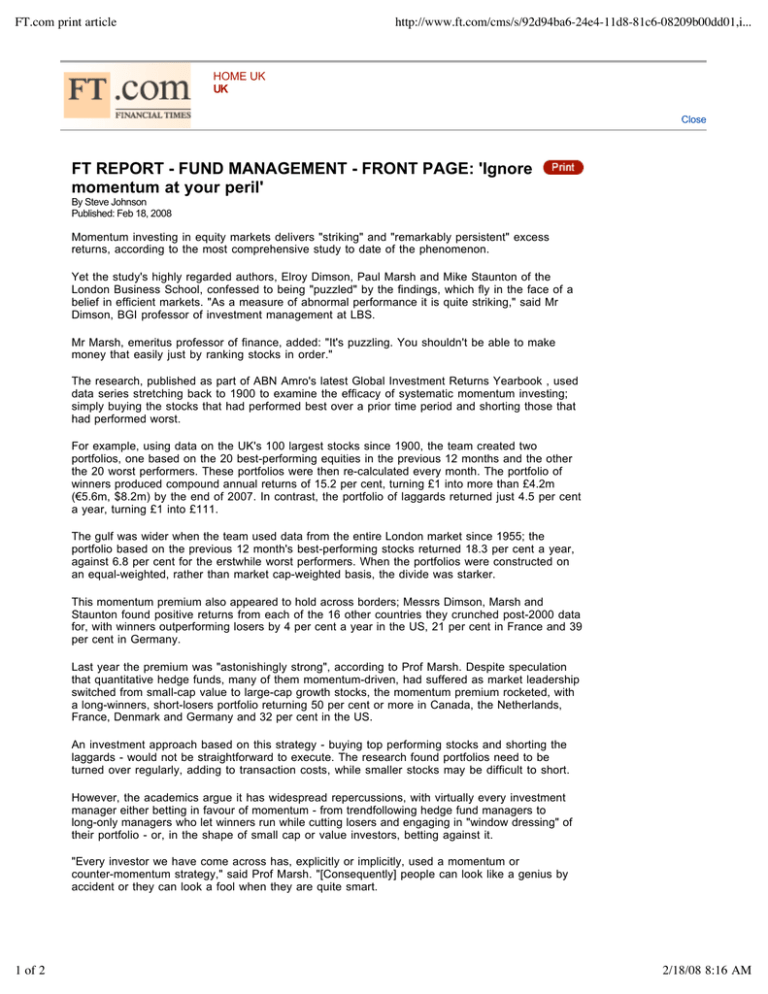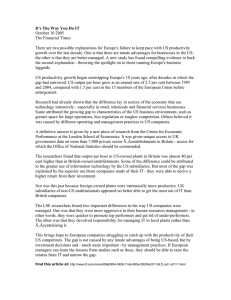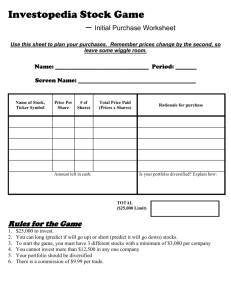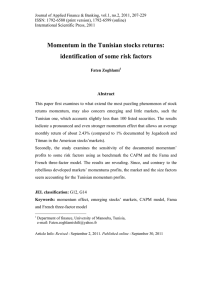Financial FT REPORT - FUND MANAGEMENT - FRONT PAGE: 'Ignore
advertisement

FT.com print article Financial http://www.ft.com/cms/s/92d94ba6-24e4-11d8-81c6-08209b00dd01,i... HOME UK UK Close FT REPORT - FUND MANAGEMENT - FRONT PAGE: 'Ignore momentum at your peril' By Steve Johnson Published: Feb 18, 2008 Momentum investing in equity markets delivers "striking" and "remarkably persistent" excess returns, according to the most comprehensive study to date of the phenomenon. Yet the study's highly regarded authors, Elroy Dimson, Paul Marsh and Mike Staunton of the London Business School, confessed to being "puzzled" by the findings, which fly in the face of a belief in efficient markets. "As a measure of abnormal performance it is quite striking," said Mr Dimson, BGI professor of investment management at LBS. Mr Marsh, emeritus professor of finance, added: "It's puzzling. You shouldn't be able to make money that easily just by ranking stocks in order." The research, published as part of ABN Amro's latest Global Investment Returns Yearbook , used data series stretching back to 1900 to examine the efficacy of systematic momentum investing; simply buying the stocks that had performed best over a prior time period and shorting those that had performed worst. For example, using data on the UK's 100 largest stocks since 1900, the team created two portfolios, one based on the 20 best-performing equities in the previous 12 months and the other the 20 worst performers. These portfolios were then re-calculated every month. The portfolio of winners produced compound annual returns of 15.2 per cent, turning £1 into more than £4.2m (€5.6m, $8.2m) by the end of 2007. In contrast, the portfolio of laggards returned just 4.5 per cent a year, turning £1 into £111. The gulf was wider when the team used data from the entire London market since 1955; the portfolio based on the previous 12 month's best-performing stocks returned 18.3 per cent a year, against 6.8 per cent for the erstwhile worst performers. When the portfolios were constructed on an equal-weighted, rather than market cap-weighted basis, the divide was starker. This momentum premium also appeared to hold across borders; Messrs Dimson, Marsh and Staunton found positive returns from each of the 16 other countries they crunched post-2000 data for, with winners outperforming losers by 4 per cent a year in the US, 21 per cent in France and 39 per cent in Germany. Last year the premium was "astonishingly strong", according to Prof Marsh. Despite speculation that quantitative hedge funds, many of them momentum-driven, had suffered as market leadership switched from small-cap value to large-cap growth stocks, the momentum premium rocketed, with a long-winners, short-losers portfolio returning 50 per cent or more in Canada, the Netherlands, France, Denmark and Germany and 32 per cent in the US. An investment approach based on this strategy - buying top performing stocks and shorting the laggards - would not be straightforward to execute. The research found portfolios need to be turned over regularly, adding to transaction costs, while smaller stocks may be difficult to short. However, the academics argue it has widespread repercussions, with virtually every investment manager either betting in favour of momentum - from trendfollowing hedge fund managers to long-only managers who let winners run while cutting losers and engaging in "window dressing" of their portfolio - or, in the shape of small cap or value investors, betting against it. "Every investor we have come across has, explicitly or implicitly, used a momentum or counter-momentum strategy," said Prof Marsh. "[Consequently] people can look like a genius by accident or they can look a fool when they are quite smart. 1 of 2 2/18/08 8:16 AM FT.com print article http://www.ft.com/cms/s/92d94ba6-24e4-11d8-81c6-08209b00dd01,i... "Active managers who ignore the momentum effect do so at their peril." The findings appear to run counter to a welter of studies, including the ABN yearbook, which suggest that small cap and value strategies tend to outperform over time, adding to the mystery. "It is a very simple strategy, buying winners and selling losers. In a well functioning market it ought not to work," said Prof Marsh. "We remain puzzled and we are not the only ones; most academics are vaguely embarrassed about this." Copyright The Financial Times Limited 2008 "FT" and "Financial Times" are trademarks of the Financial Times. Privacy policy | Terms © Copyright The Financial Times Ltd 2008. 2 of 2 2/18/08 8:16 AM




